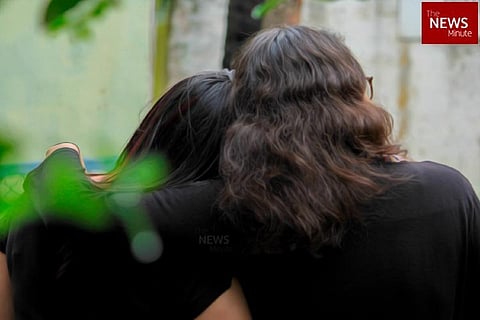

It's been two years since the Supreme Court decriminalised consensual sexual relations between adults as described in Section 377 of the Indian Penal Code – thereby, decriminalising consensual same-gender sexual activity. Over two weeks ago, five petitioners moved the Delhi High Court appealing for same-sex marriage to be allowed under the Hindu Marriage Act, 1955. The Union government has opposed this move, saying “our law, legal system, society, our values do not recognise the marriage – which is a sacrament – between a same-sex couple.”
On one hand, by heteronormative standards, the right to marry appears to be the next logical step after securing the right to love. However, several queer people in India have questioned whether marriage is really what will ultimately end up furthering the LGBTQIA+ rights discourse in the country.
Reading down of section 377 was a step towards eradicating the discrimination that LGBTQIA+ folks face, points out Moulee, co-founder of Queer Chennai Chronicles. “It started with saying the state doesn’t have the right to look into my bedroom, and ended at ‘love is love’. When it comes to non-discrimination, it should be in all aspects. In this case for example, we need marriage equality, not necessarily the right to marry for same-sex couples only.”
Marriage equality, explain Moulee and Shilpa, a doctor working in Tamil Nadu’s public healthcare setup, would be, say, to make the existing marriage laws recognise consensual union between individuals regardless of gender.
Shilpa says that same-gender marriage is just one avenue to strive for equal rights. “That said, I'd rather have protection against bullying, harassment or discrimination against LGBTQIA+ people in schools, workplaces etc to be the focus now. We already have the terrible Transgender Persons (Protection of rights) Act, which was passed despite numerous objections from trans and queer communities, at large,” she says.
She also points out that even a push for an equal marriage law, without making changes to the language and prevailing definitions of gender in the social and legal vocabulary, will not go very far. “Considering trans people are considered the "third gender", instead of having the right to choose their gender, our legal parlance does not recognise gender non-confirming and non-binary folks. Unless we seek to change that, any equal-marriage law will again subscribe to the existing exclusionary biases.”
That marriage itself is a patriarchal institution is an argument that has been made several times. However, because it enjoys legal sanction, it also confers other legal rights to a person by the virtue of being married to another.
“Since cis-het marriage is traditionally a patriarchal institution which confers power unequally among men and women (the non-recognition of marital rape not being seen as an offense in India, for example), and usually maintains the caste and class relations, a vocal segment of queer folks reject the framing of marriage as a measure of legitimacy of their relationship,” says Shilpa. Cisgender persons are those whose gender identity is the same as what is assigned at birth, while ‘het’ refers to heterosexual. “But since the current marital setup provides legal, material and social privileges, queer folks need not be pressured into rejecting these for the sake of upholding the critique against marriage,” Shilpa adds.
Vandarkuzhali, a Coimbatore-based architect, also says that while they personally find marriage a burdensome institution, and that there are other ways to be together, “it is the only way for some people to make their relationship socially relevant, and to access property, inheritance and other rights.”
Queer persons TNM spoke to also pointed out that with the legalisation of same-sex marriage, a lot of the associated patriarchal, capitalist and casteist industries – such as elite and exclusionary matrimonial services, caste-based matrimonials and so on – will also capitalise on queer marriages.
“We need marriage equality for people who want to have the option of marrying. However, there is going to a capitalist matrimony market that will prey on this as well,” Moulee says.
Vandarkuzhali adds that beyond this, unless there is a change to make other laws such as those of inheritance, adoption, pregnancy, surrogacy and property, gender neutral and inclusive, queer persons may not be able to enjoy the protections and legal advantages of marriage uniformly.
While an equal marriage law could potentially benefit some queer persons by allowing them the choice to marry, access legal protections and enjoy more social legitimacy, Shilpa points out that even that may not address the social expectation on queer persons on the aromantic and asexual spectrums as well as those practicing ethical polyamory to conform to social, heteronormative expectations.
Aromantic persons are those who are those who do not desire romantic relationships, and asexual persons are those who do not experience sexual attraction. Both of these spectrums are neither mutually exclusive nor inclusive.
“In our country and culture - aromantic and asexual people are forcibly married off to satisfy the society's expectation of a heterosexual union that ends in procreation. Many people on the asexual spectrum suffer corrective and/or marital rapes because of this. An inclusive all-gender marriage law, without associated social reform, or securing legal protection and recourse for queer folks against sexual assault (inside or outside marriage) can very well perpetuate the same violence upon asexual-spectrum persons,” she says.
“Unless we also think of alternative support systems or models that can look after un-wed people, the same-gender marriage demand will only add conformity to an aspect of queer politics,” she adds.
Referring to the petition in the Delhi High Court, Vandarkuzhali says that one should question the intent behind it. "This seems more like a right-wing approach to queer marriage,” they say, referring to the push to legalise same-sex marriage under the Hindu Marriage Act.